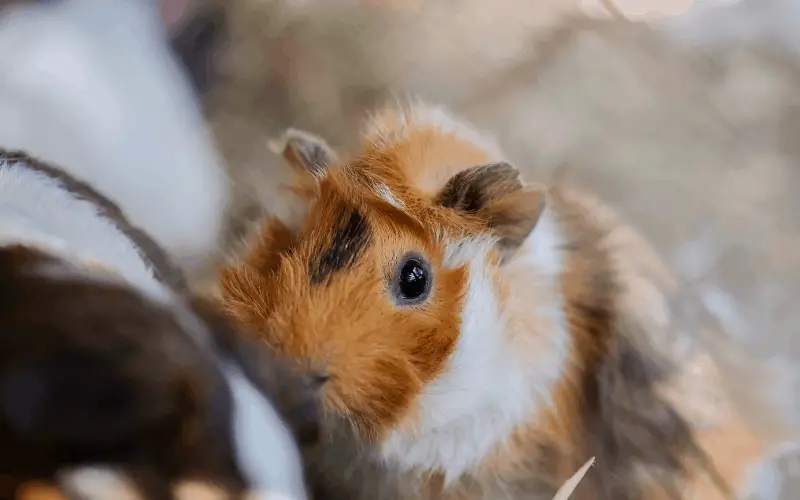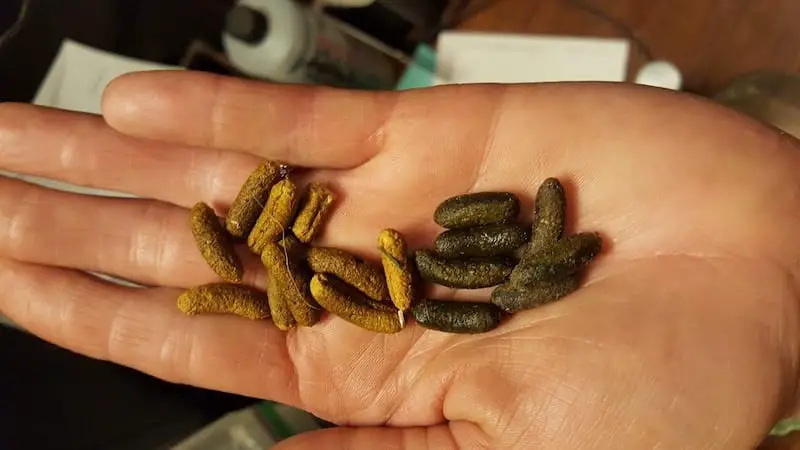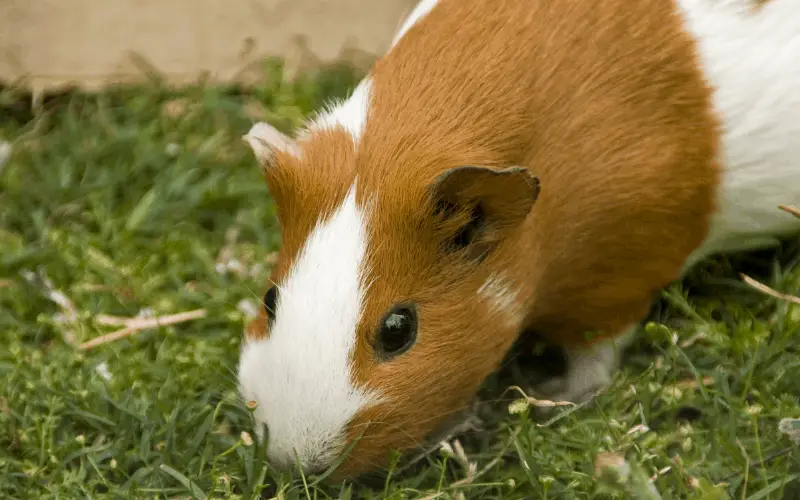Guinea pigs usually hide their symptoms of illness for a very long time, and this is a survival instinct for them. The consistency, smell, sight, size and shape of a guinea pig’s poop can be an indicator of any underlying health issues.

It is very important that you know the difference between abnormal and normal poop of guinea pigs in order to be able to quickly detect any health problems.
But why do guinea pig poop smaller than usual? Well, if you notice that your guinea pigs’ poop is suddenly smaller than usual, that’s a sign that something is wrong and you need to see a vet.
Why Do Guinea Pig Poop Smaller Than Usual?
Basically, a guinea pig suddenly producing much smaller poops than usual is an indication that something isn’t right and should be treated quickly.
First, you will need to check her weight for signs of any weight loss. Small poops generally indicates that not enough food is going through the piggies system and coming out from the other end.
Many things can cause this, but a depressed appetite and decreased gut mobility could be a sign of dental related problems, pain from another condition such as respiratory infection, bladder stones/urine infection, etc.
Whatever the cause is, we highly suggest you seek expert advice immediately so they can ascertain exactly the cause.
And if the cause isn’t tackled as quickly as possible and the guinea pig kept fed, then the gut can go into stasis, which can be tragic for your biggie.
How A Normal Guinea Pig’s Poop Looks Like

A normal poop pellet of a guinea pig appears like fibrous, round balls. The poop pellets should be hard and break up into grainy and fibrous interior when pressure is applied, it should also have no stickiness.
Due to a large amount of grass hay which is a staple part of guinea pig’s diets, their poop must have the grainy feel of crushed hay.
If the poop of your guinea pig looks any different, it could be a sign that something is wrong. When your guinea pig has an unformed poop, soft poop, or watery poop, it is a cause for concern.
Also, due to their sensitive gastrointestinal system, guinea pig tends to suffer from gastrointestinal problems quite easily. When you notice that your guinea pig’s droppings are abnormal, it can be a cause for concern.
There are also a few more signs to look out for when trying to determine if the poop of your guinea pig is normal or abnormal.
Normal Color Of A Guinea Pig’s poop
The color of poop in guinea pigs differs between guinea pigs. One guinea pig can have a dark brown poop, while another can have light brown colored poop. The only thing that matters is the consistency.
A guinea pig that is healthy will produce the same colored pellets. But If there’s a drastic change in a guinea pig’s diet, then there can be a small variation in their poop color.
Even when guinea pigs are in the same family and fed the same diet, they can also have a significant difference in their poop color. One guinea can have a yellowish-brown color, while the other guinea pig may have dark brown pellets.
When you break open a fresh poop pellet, you may notice that the inside color is sometimes lighter compared to the outside color. Sometimes, the inside color may be slightly green.
Usually, a guinea pig’s poop color may have little to no difference. But when there is a drastic change in the color between the poop pellet, this can be a significant sign, that your pet may be experiencing internal gut system problems.
Also, if your guinea pigs are fed excess protein in their diet, the color of their poop will be black. Likewise, If they are fed something like beetroot, their poop may have a little tint of red color.
Normal Smell Of A Guinea Pig’s Poop
A normal guinea pig’s poop is usually not that smelly, this makes it easy to handle their poop. However, your guinea pig’s urine might be smelly as it usually has a pungent smell.
If your guinea pig is in good health, their poop pellets shouldn’t be smelly. But if your guinea pigs are unwell or suffering from underlying health problems then their pellets may have a terrible smell.
You should note that aside from the regular poop, guinea pigs also produce cecotropes, which has a strong smell, but they are eaten by guinea pigs as it contains lots of nutrients.
What is the Normal Size Of A Guinea Pig’s Poop?
The size of a guinea pig does not determine its size of pellets. You may notice that an old guinea pig can have small pellets while a younger guinea pig can have more massive pellet poop.
But when you notice your guinea pig producing abnormal pellets that are tiny or odd in shape than usual this, can be a cause for concern. It could be an indicator of different health problems including pain, gastrointestinal issues, and appetite loss.
So, if the pellet size of your guinea pig is constant, then you have nothing to worry about even if it’s small sized.
Why Do My Guinea Pig Have Abnormal Poop?
There are different issues that can cause a guinea pig to have abnormal poops.
Guinea pigs have a very sensitive and delicate internal system. So, when you notice that your pet is producing abnormal poops it should be a cause for concern, as that indicates that there is something terribly wrong with your guinea pig.
You may not notice any other symptoms as guinea pigs are prey animals who hide their pain or hide themselves away when they are in pain. So their poop is a very vital sign of their well-being. Hence, it’s essential to keep an eye on it.
If your guinea pig is producing abnormal poops this can be a sign of upset stomach or intestinal impaction.
Watch this video: Why Do Guinea Pig Poop Smaller Than Usual?
Causes Of Soft Poops In Guinea Pigs

Guinea pigs are prey animals that get easily stressed or frightened and When this happens it can cause the movement of the intestine(s) to produce the smaller pellets than average.
But when the guinea pig is relaxed and feels safe, the size of the pellets should go back to their standard size. So when the small-sized poop pellet persists, it can be an indicator of chronic pain or intestinal problems. Intestinal impaction can also cause small pellets.
If your guinea pig produces shapeless and small pellets which are also combined with larger pellets, this might be an indicator that your guinea pig isn’t getting enough food.
When this happens, you will need to find out why your guinea pig is not eating. Health issues like an inner ear infection or dental issues can cause A guinea pig to struggle to eat their food. Other underlying health problem can also cause a loss of appetite in your pet.
If your guinea pig recently suffered from appetite loss and is still recovering, they may also have small shapeless poops.
A guinea pig has a digestive system that works throughout the day, so When they are not eating enough food, it can cause your guinea pig to produce pellets in odd ways, as they don’t have enough fibre to fully develop their pellets.
When their eating habits return back to normal, the shape and size of the poop pellets will also return to normal.
Causes Of Clumpy Poop In Guinea Pig
A normal poop pellet of a guinea pig needs to be round, single balls. Sometimes, the pellets can clump and smash together as it moves slowly from the intestine.
So, when you notice a few clumped pellets occasionally it shouldn’t be a cause for concern but, if these clusters begin to occur frequently or in a large quantity, you need to change your guinea pig’s diet.
Having less amount of fibre in their diet can cause the gut system of guinea pig to slow down. Also, when your guinea pig is in stress, they may also produce poop clumps, which is due to the response of the digestive system to the increased levels of anxiety.
poop clumps can also be a sign of aging. When this happens you would need to check in with your veterinary surgeon before making any changes in the diet of your senior guinea pig.
Causes Of Lighter Colored Guinea Pig Poop
The poop of a guinea pig can become lighter in color Due to a change in the diet of the guinea pigs. That is more likely to occur when you change the menu with light color grass hay.
the poop color of guinea pigs largely depends on their type and quality of food. The freshness of the food also has a direct impact on your guinea pig’s poop.
If your guinea pig’s diet has been fed high protein in the past, when they receive more healthy diet their poop may become lighter.
On the other hand, increasing the protein level in their diet will cause the poop to become very dark. This is a recommended situation, feeding your guinea pig excess protein can cause many health problems for your guinea pig.
Cause Of Diarrhea In Guinea Pigs
If you notice that your guinea pig is suffering from diarrhea, he should be given immediate medical attention, especially when your guinea pig is young.
This because diarrhea causes dehydration which can cause life-threatening conditions, and it is also a symptom of underlying health problems in guinea pigs.
Diarrhea can be caused by several factors and not just a change in their diet. It can be caused by Severe infection, parasites, poisoning, or antibiotics. But Sometimes, diarrhoea may be the only visual sign of a severe underlying health problem.
Diarrhea usually occurs as unformed, watery faecal matter in guinea pigs. When you notice that your guinea pig has diarrhea, you need to him to the veterinary surgeon immediately.
Causes Of Stuck Poop In Guinea Pigs
Although this isn’t a regular occurrence, it is not abnormal or uncommon to find the pellets of guinea pigs struck together. Guinea pigs like to keep themselves clean and so they groom themselves a lot.
A healthy guinea pig can groom themselves several times in a day, and this grooming process can cause your guinea pig to mistakenly ingest their fur.
Guinea pigs unlike other animals cannot vomit or cough up hairballs. This causes The ingested fur to pass through the gut system of your guinea pig.
And Sometimes during this process, the hair may get entangled with the poop pellets inside the intestine causing the poop to become stuck together with hair. Your guinea pig may also consume rug fibers or other mineral matter which might also cause poop strings.
You need to provide enough fresh hay and ensure to groom them regularly in order to reduce how frequently your guinea pig can pass the poop strings.
If your guinea pig continually eliminates the poop strings, you would need to take some measures to prevent internal blockages from occurring.
Causes Of Mucus In Guinea Pig Poop
If your guinea pig has mucus in his poop, it is a great cause for concern. Its needs immediate medical attention and should be taken to the veterinary surgeon immediately, as this is not a normal occurrence.
You can easily spot mucus in a guinea pig’s poop. It is a slimy, sticky semi-fluid matter that is light in color which will be strung between the guinea pig’s pellets. it can also surround the pellets.
The production of mucus is caused when a guinea pig’s intestine is upset or irritated. It can also be caused by Cecal impaction, mucoid enteropathy, parasites, or antibiotics that disturb the intestinal flora.
mucus also appears like a transparent, jelly-like material which can be passed out without any pellets.
How the mucus appears doesn’t matter. When this occurs You need to immediately take a sample of poop and this mucus of your guinea pig and take it to the veterinary surgeon.
You should note that your guinea pig can have some mucus in their droppings when they are recovering from stomach or intestines upset.
However, you will need to discuss the probability of mucus appearing with your guinea pig’s droppings in the future with your veterinary surgeon.
Causes Of Dry Poop In Guinea Pig
Sometimes the pellets of guinea pig tend to dry out naturally. But, if your guinea pig’s pellet tends to become dry and crumbly frequently it might be a sign of dehydration.
If your guinea pig doesn’t receive enough water, its body will try to save the liquid for other bodily functions, which results in dry dropping.
When the fresh pellets get drier, it can become mashed when they are pressed together. the color of the droppings can also change when they get drier compared to the standard color of pellets of guinea pigs.
Different factors like less fiber in guinea pig’s diet, intestinal upset, or appetite loss can cause dry poop in guinea pigs.
Conclusion
If you notice that your guinea pig poop is smaller than usual, you should ensure to carry out a thorough observation. This is because guinea pigs tend to hide symptoms of their illness and any change in their poop is an indicator of an underlying problem.
